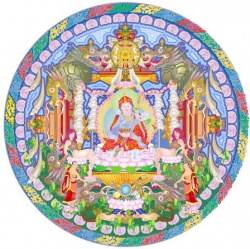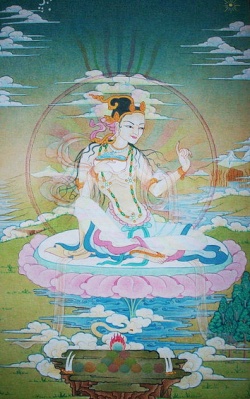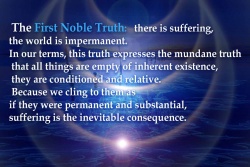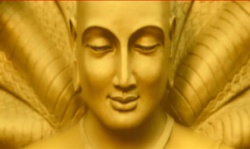Vijayāsuttaṁ: The Discourse about Vijayā
Vijayāsuttaṁ
The Discourse about Vijayā
165. Evaṁ me sutaṁ:
Thus I have heard:
ekaṁ samayaṁ Bhagavā Sāvatthiyaṁ viharati
at one time the Gracious One was dwelling near Sāvatthī
Jetavane Anāthapiṇḍikassa ārāme.
at Anāthapiṇḍika's grounds in Jeta's Wood.
Atha kho Vijayā bhikkhunī, pubbaṇhasamayaṁ nivāsetvā,
Then the nun Vijayā, having dressed in the morning time,
pattacīvaram-ādāya, Sāvatthiṁ piṇḍāya pāvisi.
after picking up her bowl and robe, was entering Sāvatthī for alms.
Sāvatthiyaṁ piṇḍāya caritvā, pacchābhattaṁ piṇḍapātapaṭikkantā,
After walking for alms in Sāvatthī, and returning from the alms-round after the meal,
yena Andhavanaṁ tenupasaṅkami divāvihārāya,
she approached the Blind Man's Wood to pass the day,
Andhavanaṁ ajjhogahetvā,
and having entered Blind Man's Wood,
aññatarasmiṁ rukkhamūle divāvihāraṁ nisīdi.
she sat down at the root of a certain tree to pass the day.
Atha kho Māro Pāpimā
Then the Wicked Māra
Vijayāya bhikkhuniyā bhayaṁ chambhitattaṁ lomahaṁsaṁ uppādetukāmo,
desiring to give rise to fear, terror, and horror in the nun Vijayā,
samādhimhā cāvetukāmo, yena Vijayā bhikkhunī tenupasaṅkami,
desiring to drive her out of concentration, approached the nun Vijayā,
upasaṅkamitvā Vijayaṁ bhikkhuniṁ gāthāya ajjhabhāsi:
and after approaching he addressed the nun Vijayā with a verse:
“Daharā tvaṁ rūpavatī, ahañ-ca daharo susu,
“You are a beautiful maiden, and I am a youthful man,
Pañcaṅgikena turiyena, eh' Ayye 'bhiramāmase.” ti
Come, Sister, let us enjoy ourselves with the fivefold musical instruments.” [1]
Atha kho Vijayāya bhikkhuniyā etad-ahosi:
Then it occurred to the nun Vijayā:
“Ko nu khvāyaṁ manusso vā amanusso vā gāthaṁ bhāsatī?” ti
“Who is this, a human or a non-human, speaking this verse?”
Atha kho Vijayāya bhikkhuniyā etad-ahosi:
Then it occurred to the nun Vijayā:
“Māro kho ayaṁ Pāpimā
“This is the Wicked Māra
mama bhayaṁ chambhitattaṁ lomahaṁsaṁ uppādetukāmo,
desiring to give rise to fear, terror, and horror in me,
samādhimhā cāvetukāmo, gāthaṁ bhāsatī.” ti
desiring to drive me out of concentration, who speaks this verse.”
Atha kho Vijayā bhikkhunī: Māro ayaṁ Pāpimā iti viditvā,
Then the nun Vijayā having understood: This is the Wicked Māra,
Māraṁ Pāpimantaṁ gāthāhi paccabhāsi:
replied with these verses to the Wicked Māra:
“Rūpā saddā rasā gandhā phoṭṭhabbā ca manoramā,
“Delightful forms, sounds, tastes, smells and touches,
Niyyātayāmi tuyheva, Māra nāhaṁ tĕnatthikā.
I assign (them) to you, [2] Māra, I am not seeking for that.
Iminā pūtikāyena, bhindanena pabhaṅgunā,
With this putrid body, [3] which is brittle [4] and frail, [5]
Aṭṭīyāmi harāyāmi, kāmataṇhā samūhatā.
I am distressed [6] and ashamed, [7] and have rooted up sensual craving.
Ye ca rūpūpagā sattā, ye ca arūpaṭhāyino,
There are beings who reached form, and those in the formless state,
Yā ca santā samāpatti sabbattha vihato tamo.” ti
(But) those who have attained to peace [8] have destroyed darkness everywhere.” [9]
Atha kho Māro Pāpimā: “Jānāti maṁ Vijayā bhikkhunī!” ti
Then the Wicked Māra (thought): “The nun Vijayā knows me!”
dukkhī dummano tatthevantaradhāyī ti.
and pained and depressed he vanished right there.
Footnotes
- ↑ Comm: Pañcaṅgikenā ti ātataṁ vitataṁ ātatavitataṁ ghanaṁ susiran-ti evaṁ pañcaṅgasamannāgatena; with the five musical instruments means being endowed with the fivefold musical instruments thus: a one-faced drum, a two-faced drum, a stringed instrument, a clapper and a flute. These are translated in accordance with the sub-commentarial explanation.
- ↑ Comm: niyyātayāmi tuyhevā ti sabbe tuyhaṁ yeva demi; I assign (them) to you means I surely give all of them to you.
- ↑ Comm: pūtikāyenā ti suvaṇṇavaṇṇo pi kāyo niccaṁ uggharitapaggharitaṭṭhena pūtikāyo va, tasmā evam-āha; with (this) putrid body means this golden-coloured body is a putrid body which is always oozing and trickling, therefore this is said.
- ↑ Comm: bhindanenā ti bhijjanasabhāvena; brittle means having the nature of brittleness.
- ↑ Comm: pabhaṅgunā ti cuṇṇavicuṇṇaṁ āpajjanadhammena; frail means having the nature to undergo being crushed to pieces.
- ↑ Comm: aṭṭīyāmī ti aṭṭā pīḷitā homi; I am distressed means I am grieved and harassed
- ↑ Comm: harāyāmī ti lajjāmi; I am ashamed means I am abashed.
- ↑ Comm: santā samāpattī ti aṭṭhavidhā lokiyasamāpatti ārammaṇasantatāya aṅgasantatāya ca santā ti vuttā; attained to peace means it is said that in eight ways the mundane attainments bring peacefulness to the limbs and to sense-objects. This is interpreting the last line as referring to only mundane attainments, which doesn't make good sense to me; there is evidently a contrast intended in the verse between those still attached to sense pleasures, form and the formless, with those (referred to in the last line) who have gone beyond.
- ↑ Comm: sabbatthā ti sabbesu rūpārūpabhavesu, tesaṁ dvinnaṁ bhavānaṁ gahitattā gahite kāmabhave aṭṭhasu ca samāpattīsū ti. Etesu sabbesu ṭhānesu mayhaṁ avijjātamo vihato ti vadati; everywhere means in all the form and formless worlds, the grasping nature of these two worlds and the eight attainments grasped-at in the sensual world. For me the darkness of ignorance is destroyed in these places, is what is said.







